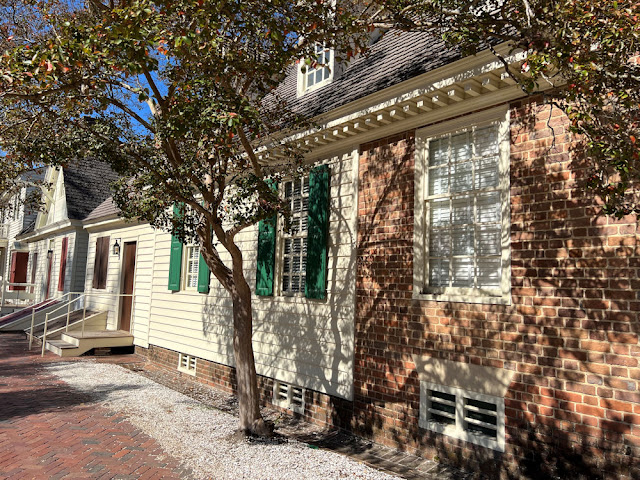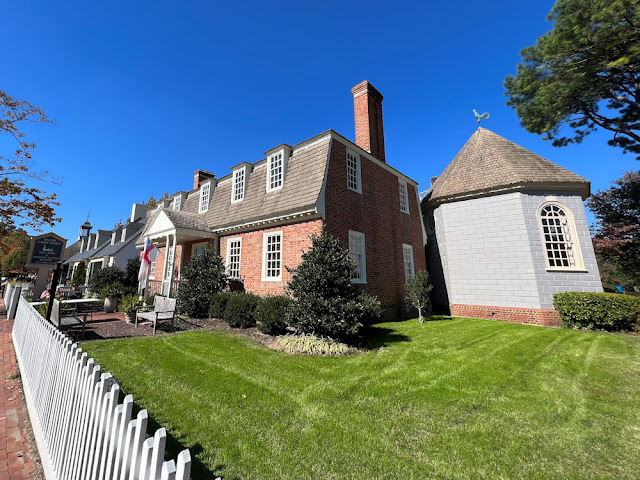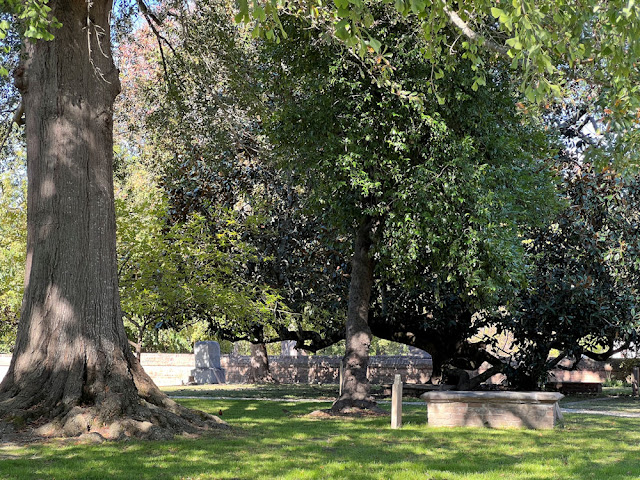I am in the middle of another post on Williamsburg and have been reading a lot on colonial times. As often happens, I came across people unknown to me, such as Anne Bradstreet from 1612-1672, and her photo I found online. There is no connection to Williamsburg as far as I know, but I enjoyed this lady’s writings very much, and she lived in that time frame.
I also read this description:
"At a time when it was considered unacceptable for women to write, Anne rejected the prevailing ideas of women's inferiority. She endured criticism, not for the quality of her work but that she, a woman, dared to write.
"The Tenth Muse Lately Sprung Up in America” (1650), was her first volume of poetry, first published in London, and favorably received. Published under the pseudonym "A Gentlewoman from Those Parts," this collection, like Ann Bradstreet's subsequent work, reflected the duties of a Puritan woman to God, home and family. She did so skillfully, and occasionally allowed notes of cynicism to creep in - perhaps the only form of rebellion possible for a woman of her time. For example: "I am obnoxious to each carping tongue that says my hand a needle better fits.""
This poem stood out for me. It is long but one I thought very much worth my time. I want to read it again and that's why I am sharing it here, and hopefully you will enjoy it also. She uses birds as a metaphor for her children. Another reason I was drawn to her poem. It is dated June 23rd, 1659.
"I had eight birds hatched in one nest,
Four cocks there were, and hens the rest.
I nursed them up with pain and care,
Nor cost, nor labour did I spare,
Till at the last they felt their wing,
Mounted the trees, and learned to sing;
Chief of the brood then took his flight
To regions far and left me quite.
My mournful chirps I after send,
Till he return, or I do end:
Leave not thy nest, thy dam and sire,
Fly back and sing amidst this choir.
My second bird did take her flight,
And with her mate flew out of sight;
Southward they both their course did bend,
And seasons twain they there did spend,
Till after blown by southern gales,
They norward steered with filled sails.
A prettier bird was no where seen,
Along the beach among the treen.
I have a third of color white,
On whom I placed no small delight;
Coupled with mate loving and true,
Hath also bid her dam adieu;
And where Aurora first appears,
She now hath perched to spend her years.
One to the academy flew
To chat among that learned crew;
Ambition moves still in his breast
That he might chant above the rest
Striving for more than to do well,
That nightingales he might excel.
My fifth, whose down is yet scarce gone,
Is 'mongst the shrubs and bushes flown,
And as his wings increase in strength,
On higher boughs he'll perch at length.
My other three still with me nest,
Until they're grown, then as the rest,
Or here or there they'll take their flight,
As is ordained, so shall they light.
If birds could weep, they would my tears
Let others know what are my fears
Lest this my brood some harm should catch,
And be surprised for want of watch,
Whilst pecking corn and void of care,
They fall un'wares in fowler's snare,
Or whilst on trees they sit and sing,
Some untoward boy at them do fling,
Or whilst allured with bell and glass,
The net be spread, and caught, alas.
Or lest by lime-twigs they be foiled,
Or by some greedy hawks be spoiled.
O would my young, ye saw my breast,
And knew what thoughts there sadly rest,
Great was my pain when I you fed,
Long did I keep you soft and warm,
And with my wings kept off all harm,
My cares are more and fears than ever,
My throbs such now as 'fore were never.
Alas, my birds, you wisdom want,
Of perils you are ignorant;
Oft times in grass, on trees, in flight,
Sore accidents on you may light.
O to your safety have an eye,
So happy may you live and die.
Meanwhile my days in tunes I'll spend
Till my weak lays with me shall end.
In shady woods I'll sit and sing,
And things that past to mind I'll bring.
Once young and pleasant, as are you,
But formers toys (no joys) adieu.
My age I will not once lament,
But sing, my time so near is spent.
And from the top bough take my flight
Into a country beyond sight,
Where old ones instantly grow young,
And there with seraphims set song;
No seasons cold, nor storms they see;
But spring lasts to eternity.
When each of you shall in your nest
Among your young ones take your rest,
In chirping language, oft them tell,
You had a dam that loved you well,
That did what could be done for young,
And nursed you up till you were strong,
And 'fore she once would let you fly,
She showed you joy and misery;
Taught what was good, and what was ill,
What would save life, and what would kill.
Thus gone, amongst you I may live,
And dead, yet speak, and counsel give:
Farewell, my birds, farewell adieu,
I happy am, if well with you."
You can read more about her life here.
I am slowly getting through my photos from Williamsburg, as you can see.
Have a great day and















Thank you for introducing me to a skilled poet about whom I knew nothing.
ReplyDeleteYou are very welcome Sue, she was very gifted in words.
DeleteWow! Oh my, this is a wonderful poem! She has quite a lot of fears for her young innocent children. I think my favorite part is her passage to Heaven. You DO find the BEST poems!
ReplyDeleteIt is a powerful poem isn’t it Ginny? :) I found it very touching, especially the part you mentioned. I felt fortunate to learn about this lady, she sounded amazing.
DeleteIt's an excellent poem of observation of the birds..
ReplyDeleteThank you Margaret, glad you thought so :)
DeleteExceptional share. The maternal thoughts never changed...from yore to today. Her words are truly motherly love, thru & thru.
ReplyDeletePs..."And from the top bought take my flight". Bough?!?
I am happy you enjoyed her poem Anni. Applauding here for catching my typo :) Thank you so much, It is indeed “bough” which I have now changed. I read this poem must have been a dozen times and it is so clear to me after your mention that it should have said “bough”. I cut and pasted this poem. I am checking another version now to make sure there are no other mistakes.
DeleteWhat an amazing poem about birds with a nice collection of peaceful looking photos
ReplyDeleteThank you Roentare, so glad you enjoyed:)
DeleteExcellent poem.
ReplyDeleteGreat, so glad you thought so. Thanks Ann :)
DeletePerfect photos to go with these words. I feel like she does. I suppose some things never change.
ReplyDeleteYes Sandi, our feelings are timeless down through through the ages. Thank you :)
DeleteThis is brilliantly written, a work of poetry that expresses in timeless picturesque detail the never-ending love, worry and hope of mothers for their children … and in her case, times eight!
ReplyDeleteI thought so too Penelope, and she was a very caring lady. Thank you :)
DeleteGosh, it's great times are changing. Lovely poetry!
ReplyDeleteThank you Jenn, yes indeed :)
DeleteI have never heard of Anne Bradstreet, but what a remarkable poem. Thanks for sharing. Cheers Diane
ReplyDeleteYou are very welcome and happy you enjoyed. Thank you Diane, you are very welcome :) Cheers to you too.
DeleteGostei de ver estas belas fotografias.
ReplyDeleteUm abraço e continuação de uma boa semana.
Andarilhar
Dedais de Francisco e Idalisa
Livros-Autografados
Estou feliz que você tenha gostado. Muito obrigado. um abraço e continuação de boa semana :)
Deletetodays photos made me feel as though I was THERE with you on your walkabout in Williamsburg. I did force myself to read the entire poem even though I am without a poets heart. You are making me read poems which I never did. only the ones forced to do in English lit. I still do not love them, but have found a few that i could understand. this one I would not know what it meant without your explanation. this makes me once again so happy I live now and not then
ReplyDeleteThank you Sandra, so glad you enjoyed the photos :) Understand completely your comments. I had an English teacher who opened up the world of poetry. She always made it so clear when I was confused. I have loved poetry ever since and will always be grateful to her.
DeleteThat's a great poem. It's amazing that she figured out how to make her voice heard so long ago.
ReplyDeleteVery true, amazing! Thank you Yogi :)
DeleteThat is a good poem.
ReplyDeleteHappy you enjoyed William :) Thank you!
DeleteWhat a beautiful, poignant poem! Wonderful.
ReplyDeleteThank you Gigi :) happy you found it so.
DeleteWonderful! Thanks for sharing this.
ReplyDeleteYou are very welcome Christine, so glad you enjoyed it. Thank you!
DeleteOh my, Denise, this poem brought tears. Happy ones and sad ones all at once for me. I will have to read more about this brilliant woman from long ago! Thank you for introducing her to me. What a voice she had and one like you say still rings for us today. I love her analogies to birds. Your photos are wonderful to go along with her beautiful words.
ReplyDeleteThank you Martha Ellen and you are very welcome :) This poem is evocative and brought all kinds of emotions to me too. She certainly was an amazing lady, especially for her time.
DeleteFascinating post! Imagine how tough it was when your children moved far away and there might even telephones.
ReplyDeleteVery true Linda, if you got on a boat to the New World, or anywhere for that matter back in those days, that was the last time you would ever see or hear from your family, or it might be months and months before a letter would get through, if it ever arrived. It's hard enough to be thousands of miles away now but we have modern technology to keep us connected. Not the same as being there in person but still connected.
DeleteI just love this post. When I was younger, I often read poetry and even several times wrote them. Somehow in the years of life I left poetry behind. The poem was poignant and lovely. Thank you.
ReplyDeleteSo glad Carol you enjoyed this Carol. I hope you will start reading them again, and also writing your own. That would be wonderful :)
Delete'I happy am, if well with you'
ReplyDeleteThose words so true, what a wonderful poem.
All the best Jan
Those lines stuck with me too Jan :) That's all we want for our children even now, for them to be happy which makes us happy. All the best to you too.
DeleteWhat a wonderful poem. I'm saving this post so I can read it again.
ReplyDeleteThanks for introducing me to this talented poet(ess?).
P.S. Your photos are beautiful.
I am very happy you like it enough to read again Great Granny G :) And you are very welcome. Thank you so much :)
Delete